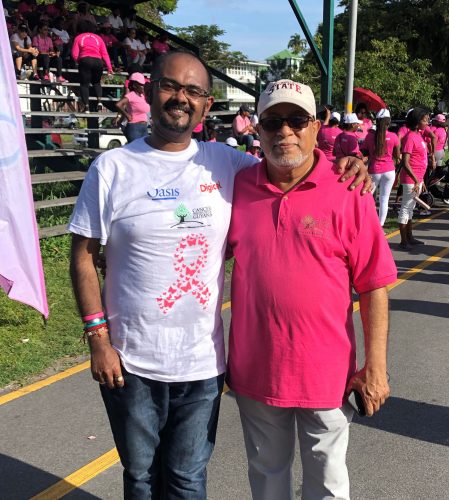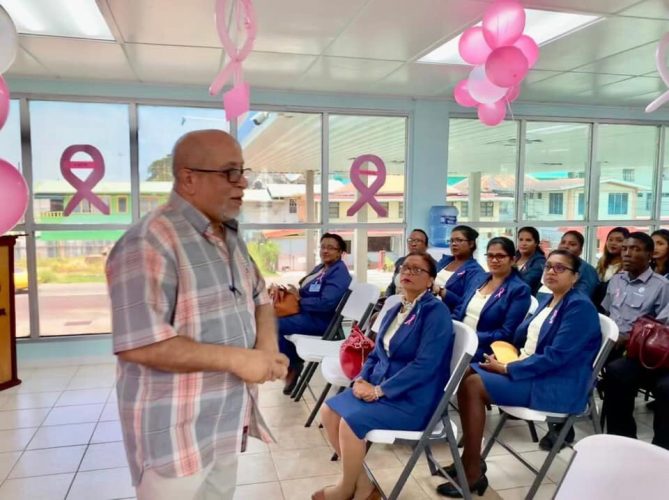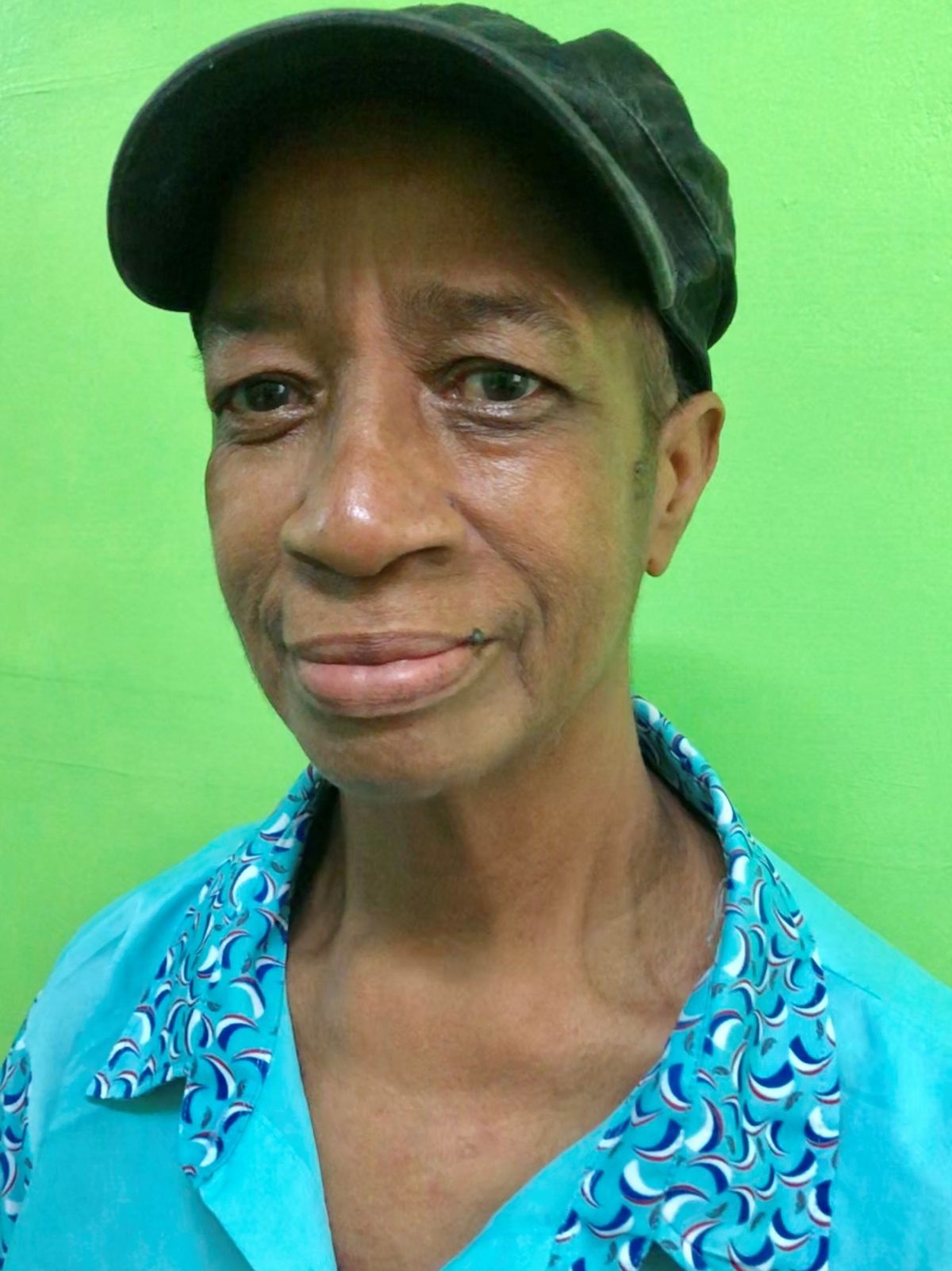Even with heightened awareness, Marcia Burrowes, 63, initially ignored a lump she felt on her right breast until a friend advised her about screening, which led to her being diagnosed with stage two breast cancer.
She told Stabroek News (SN) that she “thought it [the lump] would go away and did not take it for anything.” She is now relieved that she was able to detect it early and become a survivor.
The CIG held its breast cancer awareness walk in Georgetown on Sunday, trumpeting its motto: “Early detection saves lives,” and “cancer is curable.”

They recognized the breast cancer survivors who participated in the walk and also observed a minute of silence in remembrance of those who lost their lives in the battle.
Burrowes only took the lump seriously after her friend, who was diagnosed with stage four breast cancer, told her that her symptoms started out with a lump.
“She told me she had a similar lump and that I need to get screened and that was when I realized what I was playing with,” she said.
An ultrasound showed that she had a cyst in the breast. And having lost her father and an aunt to cancer, it hit home that she, too, could be a victim.
She decided to travel to the US to undergo more tests. She found out that the cyst was cancerous but she “didn’t take it too hard because it (cancer) run in the family.”
A surgery was then performed to remove the cysts and she remained in the US for a year taking radiation treatment.
When she returned to Guyana she did another test and it was discovered she had a lump in the nipple of the same breast. She was told this time that she had stage one cancer and later had a mastectomy done.
Throughout all this she kept her composure and said: “I build my mind to fight it.” But at one point she almost gave up when the side effects of the chemotherapy became a struggle for her to deal with.
She said it caused her to “feel sick” and she was unable to eat and had lost a lot of weight. But she continued after her doctor encouraged her and told her that the side effects were only temporary.
She was happy that she went through with it and said when the chemotherapy sessions ended she felt a lot better. She also advised other patients not to give up and to look at the benefits of the treatment.
This newspaper also spoke to other cancer survivors who shared their stories.
Mission
With October being Breast Cancer Awareness Month, the Cancer Institute of Guyana

(CIG) is on a mission to educate the public about early screening and detection.
Oncologist, Dr. Sayan Chakraborty and outreach director, Syed Ghazi have been invited to speak to staff at corporate entities about breast and other types of cancers.
They also provide information about the symptoms and the importance of chemotherapy and other treatments.
They are also creating awareness throughout the year through outreach clinics, distribution of pamphlets and messages on the CIG’s Facebook page.
Dr. Ghazi told SN that with some people discouraging patients from taking chemotherapy treatment and telling them that the side effects would kill them, it makes their work harder.
In fact, it was for that reason that 53-year-old Rhonda (not her real name) was apprehensive about taking treatment when she was diagnosed with stage three rectal cancer.
She told this newspaper that some people were telling her that the side effects from the chemotherapy would make her condition get worse and even kill her.
She only agreed when Dr. Chakraborty informed her that the chemotherapy would kill the cancer cells and that when the treatment ended the side effects would go away.
Dr. Chakraborty told this newspaper that patients no longer have to worry because at present they have the drugs to combat the side effects of chemotherapy.
He said too that “chemotherapy would no longer be such a dreaded treatment.”
One of the medicines, he said, can decrease the vomiting and nausea by ninety percent.
According to him, radiation treatment for breast cancer is easier to take than chemotherapy as side effects may only be darkening of the skin.
They have the “full spectrum” available at the CIG; from “diagnosis with ultrasound guided breast biopsies, to treatment with radiation and chemotherapy.”
Rhonda has almost completed her sessions of chemotherapy and is already feeling better. Despite facing the side effects, including weakness, nausea, hair loss and loss of appetite, she was determined to complete the battle.
She said if she had not gone through with the treatment there was no way she would have been able to defeat the cancer.
The CIG also joins in the fight against cervical cancer in remote areas in the country where screening is not available.
Cervical cancer, which is caused by the HPV virus can be easily detected by a Pap smear and once it is diagnosed early, can be treated effectively.
Dr. Ghazi said many patients end up losing their lives much sooner as a result of not taking the treatment.
He mentioned the case of a 30-year-old woman whom he diagnosed with cervical cancer in February this year. The woman started treatment but stopped after she was told that her problem was not medical but it was “spiritual.”
The woman’s condition deteriorated rapidly and she died a few weeks ago.
He said financing is also one of the factors preventing patients from seeking treatment.
He recalled too that during one of his outreach clinics he diagnosed another woman with ovarian cancer in the early stages.
He recommended a CT-scan and biopsy. He also offered to pay for the tests through a medical fund at CIG but the woman chose to seek herbal treatment instead.
One year later, she was feeling sick and she revisited his outreach clinic to “check if the cancer was gone.” But by then it had already progressed to advanced stages.
While he is not against spiritual healing and herbal treatment, he said, it can be done together with the treatment.
Severe pain
Rhonda’s symptoms started with severe pain in the rectum and with having difficulties in defecating. She could not sleep because of the pain and had also lost her appetite.
Doctors initially told her she had haemorrhoids and gave her treatments but she got no relief.
She then decided to visit a surgeon who recommended a biopsy. The results came back positive and she was very sad but she “didn’t cry and throw down myself. I took it well…”
In preparation for her surgery she had to have a colostomy bag attached. She then started radiation and chemotherapy. She has almost completed her treatment and said the pain has reduced.
Rhonda, an accountant, said since her diagnosis last year she has gotten a lot of support from family, friends and coworkers.
She said too that the staff and patients at CIG are “very warm” and helpful.
She was even more determined to fight as she had lost her father to prostate cancer a few months before her diagnosis. An aunt also died of cancer more than 15 years ago.
Rhonda advised others to look out for any abnormal changes in their bodies and to have regular checkups.
She said what she went through was not easy and urged members of the public to get screened early so that their pain and symptoms would be less.
Harry (not his real name) who was diagnosed with stage four prostate cancer also wants to save others from the suffering he went through. He urged persons not to delay if they notice something different about their bodies and said “they should go and check it out at the doctor…”
In June 2017 when he visited the doctors for a severe pain in his “pelvic bone” he did one test after the other but they showed nothing.
A biopsy eventually led to his diagnosis.
The news hit him and his family really hard especially when the doctors told him that he had only four months to live if he was not treated properly.
But he was determined to overcome the cancer through aggressive treatment and prayers.
His children also decided to join in the fight and started researching on the internet. They learnt that his symptoms could be less if he made lifestyle changes such as eating healthy.
Harry who has been a vegetarian for almost 40 years had no problem adjusting to a healthy lifestyle.
He never missed a session of his chemotherapy and other
treatment, which brought his prostate specific antigen – PSA level down from 54 to 0.08.
He recalled that before he was diagnosed he thought that the pain he was experiencing was as a result of a hit he got when he fell over 25 years ago.
Along the way with the treatment, further tests proved that the cancer had spread first to his ribs and later to his shoulder blade.
That resulted in him having to take three sets of chemotherapy treatment.
Even though he felt weak from the treatment and suffered a lot of side effects, he said it helped him to get back on his feet.
He recalled that before he was diagnosed, his pain was so intense that he was dragging himself around. After a while he was unable to climb the stairs and had to sit and drag himself up.
“It is not easy what I went through. Who get it know what it is…,” he said.
His whole life had changed and he could not be a part of family activities that he was engaged in before.
But with prayers, “God showed me the way… I am doing a lot better now.”
Swelling on chest
Amit (name changed to disguise identity) was enjoying life like a normal 22-year-old until he noticed a swelling on the right side of his chest.
He was also experiencing difficulties in breathing and could hardly walk as a result.
Tests for tuberculosis and bronchitis came back negative.
After that a CT-scan found that there was a huge mass in the liver. He was shocked to learn this because “I am not a smoker and I am not a drinker…” There was also fluid in his liver.
He was even more devastated when the results of a biopsy proved that he had stage three cancer.
He later found out that the doctor told his close friend, who accompanied him, that he had only three months to live and that they were not sure if the treatment would work.
But after the first session of chemotherapy the fluid was pulled from his liver and the breathing problems eased. He also started walking normally again. He finished six sessions of chemotherapy and feels as though he is back to his normal self.
He has to start radiation and the doctor assured him that after that he would be fine.
He described the first session of chemotherapy as a walk through. But from the second session all this changed. Nothing stayed down his stomach. “I felt upset and hungry at the same time but I couldn’t eat… I felt as though I couldn’t take it anymore.”
He suffered a lot of pain but got courage through support from family and friends and from when he started seeing results.
At the time of his diagnosis he was pursuing a course at UG and working as an insurance advisor.
He has started working again and said that the company is “the best place I ever worked. They gave me a lot of support and my personal health insurance helped with bills.”
The cancer has “disrupted my whole life” but he advised others who are diagnosed: “it’s not the end man. Once you have prayers and good support, trust me you can get through this.”
He said that as a young person he never used to pray and would “just go with the flow.”
But now he goes to church regularly with the encouragement of his friend, who is “more like a brother and has been with me every step of the way.”
Through research, he is maintaining a healthy diet and “is seeing results and feeling much better every day.”
He recalled that his family took the news of his diagnosis hard and were very worried.
During chemotherapy he felt weak and wanted to stay in bed but he chose to move around and “fight it.”
He said: “Basically it is the mindset and once you are willing to fight it and push on there is nothing that can keep you down.”
Through internship at a hospital and being involved as a support worker he assisted with cancer patients but never thought that one day he could be a victim.
“I was scared… The idea in your head is that’s it, there’s no coming back. But now that I’m experiencing it, I know that it’s a lie. The possibility of beating it might be slim but you never know what you can achieve. From then to now I’m living a normal life and with the CT scan I did two days ago the doctor said everything looks good.”
He encouraged others too that: “Once you set your mind you can achieve anything and overcome everything. That is the kind of motivation I build for myself and that is the kind of mindset I have. It has been working for me.”
He also wanted the public to know that “cancer is real and it is important for you to get screened so that there can be early detection. You don’t want to wait until it reaches stage four when it is harder to fight off.”
He said chemotherapy for him was a plus. He too admits that there are side effects like “if it wasn’t for chemotherapy I would not have been here. It helped me a lot and I find that there are more positives to it than negative.”
He said he had full-grown hair and was distressed that he would be bald but his friend asked him if he “rather choose the hair or his life…”
He has started to get the hair back and is feeling healthy already.
A friend who is a nutritionist advised him that natural juices are better in terms of eliminating the cells.
Meanwhile, many people have heeded the call to have early screening, especially during October for Breast Cancer Awareness month.
Some corporate entities have also provided donations to the CIG for this cause and Dr. Ghazi is confident that together they can successfully fight the monster called cancer.






